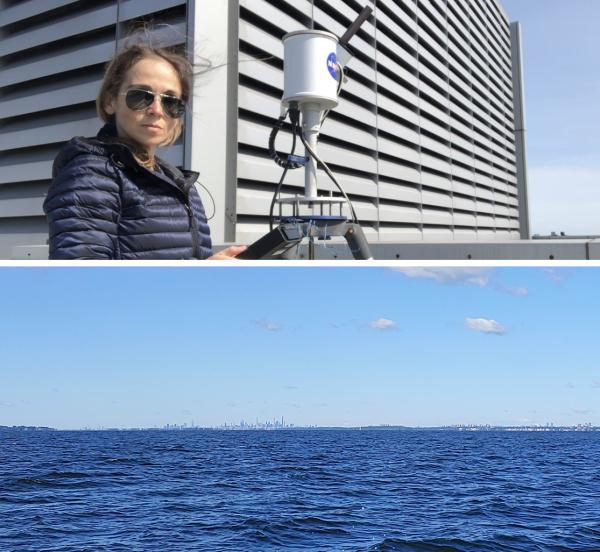
CCNY oceanic and atmospheric scientist Maria Tzortziou is engaged in an NSF-funded collaborative study of Long Island Sound.
A novel study of possible COVID-19 related changes in coastal ecosystems is underway, supported by a one-year $200,000 National Science Foundation (NSF) “Rapid Response Research Collaborative Research” grant to City College of New York oceanic and atmospheric scientist Maria Tzortziou and her collaborator Dianne Greenfield of the CUNY Advanced Science Research Center. A second NSF grant of $576,000 over three years to the research team will enable a separate and unique interdisciplinary probe of urban ecosystems using an autonomous underwater vehicle (AUV).
Tzortziou’s rapid response NSF grant is entitled: “Understanding linkages between nutrient quality and phytoplankton assemblage responses to COVID-19 stay-at-home orders in an urban, estuarine system.” It explores how reductions in atmospheric contaminants (particularly nitrogen) and improved air quality, due to COVID-19 restrictions on human activity, may be affecting the biogeochemistry and ecology of the Long Island Sound.
This multidisciplinary effort focuses on coastal and estuary aquatic habitats, which are known to be particularly biologically productive and diverse. “We are measuring key biogeochemical (nutrient) and ecological (phytoplankton, bacteria) metrics to assess how sudden changes in nutrient amounts, quality, and source distribution in an urban estuary could translate to regime shifts in microbial assemblages and biogeochemical processes,” said Tzortziou.
The project will also train postdoctoral scholars and graduate students, including those from underrepresented groups in CCNY’s Division of Science, while enhancing the understanding of connections between societal activity and coastal ecosystems.
A second NSF grant of $576,000 to Greenfield, Tzortziou and Cecilia Gonzalez-McHugh of Queens College is for the acquisition of an autonomous underwater vehicle to support cross-disciplinary research and education in coastal and urban waters.
“The populated New York and surrounding coastal ecosystems provide abundant natural and economic resources,” noted Tzortziou. “Yet, urbanization combined with low elevation makes the region vulnerable to global and anthropogenic stressors such as climate change, sea level rise, intense storms, and eutrophication.
“To prepare for these challenges, it is essential to refine the understanding and predictive capabilities of associated biogeochemical, geological, and physical features and processes at fine spatial and temporal scales.”
The AUV will enhance studies of the drivers, severity, and duration of hypoxia and algal blooms, fate and transport of pollutants and contaminants, sediment movement and benthic habitat, linkages between water optical characteristics and remote sensing results, and related questions.
CUNY students, including underrepresented groups in STEM research and education, will also participate in the research. From undergraduates to postdocs.
About the City College of New York
Since 1847, The City College of New York has provided a high-quality and affordable education to generations of New Yorkers in a wide variety of disciplines. CCNY embraces its position at the forefront of social change. It is ranked #1 by the Harvard-based Opportunity Insights out of 369 selective public colleges in the United States on the overall mobility index. This measure reflects both access and outcomes, representing the likelihood that a student at CCNY can move up two or more income quintiles. In addition, the Center for World University Rankings places CCNY in the top 1.8% of universities worldwide in terms of academic excellence. Labor analytics firm Emsi puts at $1.9 billion CCNY’s annual economic impact on the regional economy (5 boroughs and 5 adjacent counties) and quantifies the “for dollar” return on investment to students, taxpayers and society. At City College, more than 16,000 students pursue undergraduate and graduate degrees in eight schools and divisions, driven by significant funded research, creativity and scholarship. CCNY is as diverse, dynamic and visionary as New York City itself. View CCNY Media Kit.